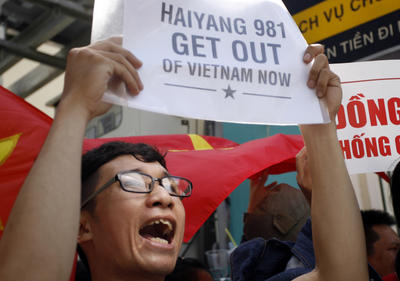, in waters that Vietnam considers to be within its 200-nautical-mile exclusive economic zone. The move sparked deadly riots in Vietnam, and a tense stand-off in the waters themselves, with Vietnamese and Chinese ships ramming each other on a regular basis and with one Vietnamese fishing boat sunk.
China occupies the disputed Paracel Islands and says it has ‘historical claims’ to a large part of the South China Sea, including waters that are much closer to other nations, although these claims are yet to be put to international arbitration or resolved bilaterally.
China’s assertion of its maritime claims in the South and East China Seas has affected China’s relations with the United States, which counts many of the rival claimants to the waters as allies or friends, and excited anxieties in a number of countries, not only those directly involved in the territorial disputes, throughout the region.
Washington called the deployment of the rig a ‘provocative’ move and has called for all countries to observe a freeze on building works and other actions on disputed islands and reefs in the South China Sea that might disturb the status quo. China has rejected this suggestion and has urged the United States to ‘stop taking sides’ in the disputes, a position to which the United States insists that it adheres.
The withdrawal of the Chinese oil rig from the waters in dispute with Vietnam, while it had been foreshadowed by Beijing and forecast by cool-headed analysts from the beginning, was greeted with outrage among some Chinese netizens who saw the move as a shameful national back-down, and, by some outside China, as evidence of the collective success in applying pressure against Chinese aggressiveness. Neither view is founded on objective reality.
And yet, from the standpoint of objective reality, it is difficult to understand exactly how the problem of these territorial disputes has so rapidly roiled relations across the South China Seas. One on-the-ground analyst in Beijing when asked from Vietnam for an assessment of the Chinese mood in response the troubles with Vietnam at the height of the oil rig crisis described it as ‘serious but bemused’, a response that surprised but one that probably captured better than most just where China was coming from in its management of these issues.
In this week’s feature, Sourabh Gupta points out that ‘China’s legal claim to sovereign rights and jurisdiction in the South China Sea, which asserts an entitlement to exclusive economic zone (EEZ) and continental shelf rights over the relevant waters, is not inconsistent with international law. “Islands”, as low-lying as Japan’s Okinotorishima, as small as the US Howland and Baker Islands, and as remote from a continental coastline as Australia’s Heard and McDonald Islands have valid or pending EEZ claims. None are inhabited or can sustain economic activity. What Beijing has (yet) to clarify nevertheless is both the scope of its “relevant waters” claim line as well as this line’s association with the “historic rights” that it appears to enforce at times to the limits of the infamous “nine-dash” line’.
The Law of the Sea, Gupta argues, is an unsatisfactory guide to referee quarrels that reside at the crossroads of disputed sovereignty claims and competing sovereign rights and jurisdiction claims.
What people have lost track of, Gupta points out, is that, while the Chinese might take recourse to punitive means, their ends are less typically threatening. The Chinese are less concerned with the ownership issue than neutralising the ownership issue and sharing the bounty of its extended economic zone. China would not have sought to strike a resource sharing deal with Japan in the East China Sea along the hypothetical median line in 2008 if it really intended to own it all. Of course, first the politics of it all must be got right in Chinese eyes. But, clearly you don’t go to war over something which you do not intend to ultimately possess or are easily able to defend.
There has been much hyperventilation about that prospect because of the disturbances to the status quo in the South (and East China) Seas from the usual suspects all sides round. The objective reality recommends a more measured assessment and approach. This includes a growing understanding in China that it has a neighbourhood problem that will only be dealt with successfully if there is rapid elevation of cooperative diplomacy on a number of fronts. There are practised modes (to which China has been party), in which these interests can be negotiated with the help of (though not the luxury of simple reliance on) the law of the sea and they are likely to lead to more productive outcomes all round.
The United States has an awkward responsibility in managing its alliances and partnerships in the region, at the same time as ensuring it is not wrong-footed in its relationship with China. While its ‘freeze’ proposals will not immediately satisfy China and the management of its interests with its neighbours in the region, it could prove a path towards ‘cooling’ these issues and creating the space for engaging with China in more productive regional diplomacy, for which the scene has now been set, at the ARF and the ASEAN plus ministerial level meetings over the coming weeks.
Peter Drysdale is Editor of the East Asia Forum.


You wrote Vietnamese and Chinese ships had been ramming each other on a regular basis. Can you name one or more instances when a Vietnamese ship rammed a Chinese ship. All the video and/or published reports I have seen have shown, or indicated it was Chinese ships being the aggressive and ramming Vietnamese vessels and in one video a large Chinese ship deliberately pursued a Vietnamese fishing boat and sank it by ramming it from behind and running up over it.